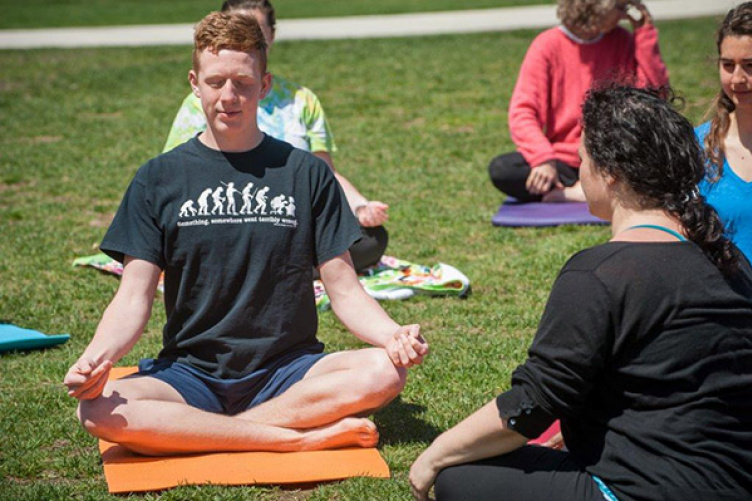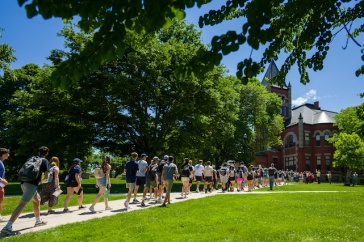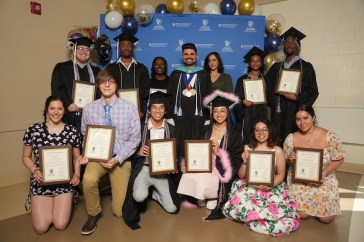
Jason Kelly ’14 used to be afraid of homework. An assignment that another student could bang out in 20 minutes would take Kelly a couple of hours, not because he struggled with the work but because he had to get it right. No—because he had to get it perfect. And, for someone like Kelly, who has obsessive compulsive disorder, perfect is impossible.
Kelly was in the 6th grade when he had his first panic attack. The following year, he was diagnosed with OCD, a brain disorder that can result in obsessive and compulsive behavior. It was bad. He required medication that left him exhausted all the time. Not just tired, exhausted. He gained weight.
And it was middle school; high school. Those tough, tough adolescent trial years.
But his parents were relentless in their commitment to helping him find a way to deal with the illness. Finally, three years ago, when he started at UNH, all of their efforts paid off and everything changed. Though a combination of alternative medicine, yoga, and grit, Kelly was able to stop the drugs. He got his energy—and his life—back.
“By the time I was a senior in high school, I was done with the effects of the medications. They worked for a while but I slept all the time; I had no energy. And I was still struggling with obsessive thoughts and compulsive actions,” the Connecticut native says.
At the same time that he was seeking alternative treatments, his mother, who is a faithful practitioner, suggested he give yoga a try. So, Kelly took a class. And then another and another. He also began meditating.
“Sometimes I could see the need to change and I knew I had to figure out a different way,” Kelly says. “Yoga and meditation helped me with awareness. It taught me to breathe, and that helped with the obsessive thoughts.”
He came up with a plan: the first semester of his freshman year, he began to taper off his medications. Next, he started exercising. By the end of winter break, he was medication-free and he had lost 40 pounds.
He no longer had to wash his hands over and over. He could drink a glass of milk at dinner and not spend the next 15 minutes picking up and setting down the empty glass until it was in the exact right spot.
“It was like a new me. I had my energy back. I hadn’t been as awake in six years,” Kelly says.
He was doing yoga every day, either on his own or in classes taught by Ruth Abelmann, associate director of residential life. Sometimes now he co-teaches with her. Sometimes he leads the class on his own.
“Yoga helps me control my thoughts. I still have them sometimes but they don’t dominate anymore; I don’t have to act on them. They’re like clouds. You can’t stop the clouds—they come, they roll by, and you just acknowledge that’s all they are.”
There were people he met early on during his first year at UNH who did not understand his behavior, his need to sleep all the time, to repeatedly wash his hands. Kelly didn’t tell them about his illness. He says he wasn’t ready to open up. “I wanted to fix it first.”
During his second year here, Kelly he found his major--accounting with a minor in economics—and another piece of his life fell into place.
“I talked to my professors and they encouraged me. I really got into it. And my grades took off,” Kelly says. “For six years, it had been a constant cycle of medications and exhaustion. I couldn’t feel anything. Then, I found this way to deal with it and it changed my life tenfold.”
Kelly isn’t afraid of homework anymore. A few weeks ago, he was inducted into the Beta Gamma Sigma International Honor Society and the Omicron Delta Epsilon, an international economics honor society. Recently he received a Presidential Scholarship. Next winter he will intern at one of the largest accounting firms in the country.
“I still have ups and downs like anyone. But I’m excited now,” he says. “I’ve got this new perspective. I’m alive. Now I want to work hard, have fun, and try to help leave the world a better place.”
-
Written By:
Bridget Finnegan | Communications and Public Affairs | bridget.finnegan@unh.edu | 603-862-1465



















































